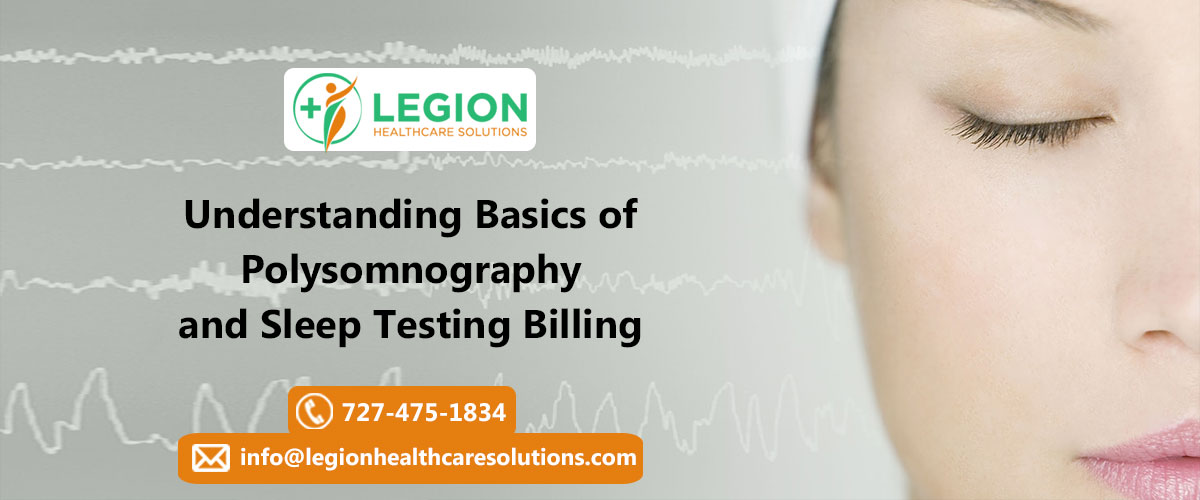
Understanding Basics of Polysomnography and Sleep Testing Billing
Basics of Polysomnography and Sleep Testing
About 40 million people in the United States suffer from sleep problems every year. Not getting enough sleep for a long time can cause health problems. Many sleep disorders can be managed by primary care physicians; however, when abnormal sleep patterns are not easily explainable and further evaluation is necessary, expert opinion and sleep studies may be needed. Polysomnography (PSG) refers to the continuous and simultaneous monitoring and recording of various physiological and pathophysiological parameters of sleep furnished in a sleep laboratory facility that includes physician review, interpretation and report. A technologist supervises the recording during sleep time and has the ability to intervene, if needed. The studies are performed to diagnose a variety of sleep disorders and to evaluate a patient’s response to therapies such as continuous positive airway pressure (CPAP). As a primary care physician, to get an accurate reimbursement, lets understand basics of Polysomnography and Sleep Testing billing.
Polysomnography and Sleep Testing Coding
Some of the commonly used CPT codes for Polysomnography and Sleep Testing are as mentioned below. These CPT codes are covered by Medicare (with proper documentation), you can check payer specific reimbursement guidelines for exact coverage.
- Non-attended sleep studies should be billed with the CPT/HCPCS code that most accurately describes the service.
- CPT code 95811 alone should be billed for split night studies as CPT code 95811 in this instance is inclusive of CPT code 95810. (Polysomnography; age 6 years or older, sleep staging with 4 or more additional parameters of sleep, attended by a technologist)
- For a study to be reported as polysomnography (PSG), sleep must be recorded and staged and directly attended by a qualified technologist. Report with modifier 52 if less than 6 hours of recording or in other cases of reduced services.
- CPT codes 95782, 95783, 95808, 95810, and 95811 include sleep staging. Medicare would not expect to see separate billings for an EEG, EOG, and/or EMG in addition to these codes.
- CPT code 95808 includes reimbursement for one to three additional parameters. CPT codes 95782, 95783, 95810 and 95811 include four or more additional parameters. Therefore, Medicare would not expect to see separate billings for additional parameters in addition to codes 95782, 95783, 95808, 95810, or 95811. Additional parameters of sleep include:
- ECG
- Airflow
- Ventilation and respiratory effort
- Gas exchange by oximetry, transcutaneous monitoring or end tidal gas analysis
- Extremity muscle activity and motor activity movement
- Extended EEG monitoring
- Penile tumescence
- Gastroesophageal reflux
- Continuous blood pressure monitoring
- Snoring
- Body positions
Documentation Requirements
- All documentation must be maintained in the patient’s medical record and made available to the contractor upon request.
- Every page of the record must be legible and include appropriate patient identification information (e.g., complete name, dates of service[s]). The documentation must include the legible signature of the physician or non-physician practitioner responsible for and providing the care to the patient.
- The submitted medical record must support the use of the selected ICD-10-CM code(s). The submitted CPT/HCPCS code must describe the service performed.
- An order from the treating physician/nonphysician practitioner as required by CFR, Title 42, Volume 2, Chapter IV, Part 410.21 (a) Ordering diagnostic tests.
- When billing for a sleep disorder test, the ordering physician’s NPI must be indicated on the claim form and the order kept on record.
- Documentation must support that the accreditation, credentialing, and training requirements as stated in the LCD were met for the clinic, technologist, and physician.
Applicable CPT Code
Group 1 Codes
- 95782: Polysom <6 yrs 4/> paramtrs
- 95783: Polysom <6 yrs cpap/bilvl
- 95807: Sleep study attended
- 95808: Polysom any age 1-3> param
- 95810: Polysom 6/> yrs 4/> param
Group 2 Codes
95811: Polysom 6/>yrs cpap 4/> parm
Group 3 Codes
95805: Multiple sleep latency test
Group 4 Codes
- 95800: Slp stdy unattended
- 95801: Slp stdy unatnd w/anal
- 95806: Sleep study unatt&resp efft
- G0398: Home sleep test/type 2 porta
- G0399: Home sleep test/type 3 porta
- G0400: Home sleep test/type 4 porta
Evaluation and Management (E/M) Codes
Sleep physicians also use Evaluation and Management (E/M) codes to bill for office visits. Evaluation and management codes are restricted to physicians and other qualified advanced nurse practitioners (NPs, PAs, etc.). Technologists cannot bill independently but they can bill incident to the physician (if certain guidelines are followed).
- 99202: Level 2 new patient office visit
- 99203: Level 3 new patient office visit
- 99204: Level 4 new patient office visit
- 99205: Level 5 new patient office visit
- 99211: Level 1 established patient office visit
- 99212: Level 2 established patient office visit
- 99213: Level 3 established patient office visit
- 99214: Level 4 established patient office visit
- 99215: Level 5 established patient office visit
Legion Health Care Solutions is a leading medical billing company providing complete billing and coding services to ensure accurate insurance reimbursement for your practice. We shared basics of Polysomnography and Sleep Testing billing for physician reference, for accurate insurance coverage and applicable procedure codes, refer to payer specific billing guidelines and reimbursement policies. To know more about our primary care billing and coding services, contact us at 727-475-1834 or email us at info@legionhealthcaresolutions.com
Get A Quote
[forminator_form id=”4528″]
